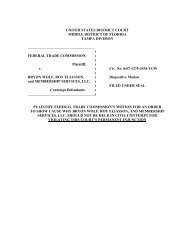Complaint Counsel's Post Trial Brief - Federal Trade Commission
Complaint Counsel's Post Trial Brief - Federal Trade Commission
Complaint Counsel's Post Trial Brief - Federal Trade Commission
Create successful ePaper yourself
Turn your PDF publications into a flip-book with our unique Google optimized e-Paper software.
1998 WL 490114 at *4, citing Thompson Medical Co. v. FTC, 791 F.2d 189 (D.C.Cir.<br />
1986), cert. denied, 107 S.Ct. 1289 (1987); Sears, Roebuck & Co. v. FTC, 676 F.2d 385<br />
(9th Cir. 1982); Warner-Lambert Co. v. FTC, 562 F.2d 749 (D.C.Cir. 1977), cert. denied,<br />
435 U.S. 950 (1978); Beneficial Corp. v. FTC, 542 F.2d 611 (3d Cir. 1976), cert. denied,<br />
430 U.S. 983 (1977). Whether speech is properly deemed "commercial speech" is a<br />
question of fact, and is based on a consideration of a varety of factors, including whether<br />
the speech (1) proposes a commercial transaction, Central Hudson Gas & Electric Corp,<br />
447 U.S. at 562; (2) refers to specific products, Bolger v. Youngs Drugs Products Corp.,<br />
463 U.S. 60, 66-67, 103 S.Ct. 2875, 2881 (1983), Friedman, 440 U.S. at 11, 99 S.Ct. at<br />
895; and (3) has an economic or commercial motivation, Bolger, 447 U.S. at 66-67; In Re<br />
Primus, 436 U.S. 412,438,98 S.Ct. 1893, 1908 n.32 (1978). Here, (1) Respondents are<br />
engagig in deceptive commercial speech, (2) Respondents promote and adverse the<br />
Challenged Products, (3) the Challenged Products are offered for sale at not insignficant<br />
prices, and (4) the adverisements refer to specific products and attbutes.<br />
6. Respondents' deceptive adverising that the DCO Products prevent, cure, and/or treat<br />
cancer violates Sections 5 and 12 of<br />
the FTC Act. An adversement is deceptive under<br />
the FTC Act if it is likely to mislead consumers, actig reasonably under the<br />
circumstances, in a materal respect. Kraft, Inc. v. FTC, 970 F .2d 311, 314. (citig<br />
Sections 5 and 12); FTC v. Direct Mkg. Concepts, Inc., 569 F. Supp. 2d 285, 297<br />
(D.Mass 2000); Telebrands Corp., 140 F.T.C. 278,290 (2005), affd, 457 F.3d 354 (4th<br />
Cir. 2006); In re Thompson Medical Co., 104 F.T.C. 648, 788 (1984), affd, 791 F.2d 189<br />
(D.C. Cir. 1986), cert. denied, 479 U.S. 1086 (1987); Clifdale Assocs. Inc., 103 F.T.C.<br />
110, 164-66 (1984); FTC Policy Statement on Deception, 103 F.T.C. 174 (1984)<br />
(appended to Clifdale Assocs.).<br />
7. In implementing the "likely to mislead" standard, "the (FTC) exames the overall net<br />
impression of an ad(verisement) and engages in a three-par inqui: (1) what claims are<br />
conveyed in the adverisement; (2) are those claims false or misleading; and (3) are those<br />
claims materal to prospective consumers." Kraft, 970 F.2d at 314. The FTC may use its<br />
own reasoned analysis to detere what claims an adverisement conveys. See Kraft,<br />
970 F .2d at 318 ("(i)n deternig what claims are conveyed by a challenged<br />
adverisement, the (FTC) relies on . . . its own viewing of<br />
the ad"); see also FTC v.<br />
Colgate-Palmolive Co., 380 U.S. 374,385 (1965). In deterg whether an<br />
adverisement conveys a claim, the <strong>Commission</strong> looks to the overall, net impression<br />
created by the adverisement, through the interaction of different elements in the<br />
adverisement, rather than focusing on the individual elements in isolation. Stouffer<br />
Foods Corp.,118 F.T.C. 746, 799 (1994); Kraft, 114 F.T.C. 40 at 122 (1991); American<br />
Home Prods. Corp. v. FTC, 695 F.2d 681, 688 (3d Cir. 1982); FTC Policy Statement on<br />
Deception, 103 F.T.C. 174, 179 (1984) (appended to Clifdale Assocs.) (emphasizing<br />
importance of considerng "the entire mosaic, rather than each tile separately").<br />
8. Featues of an adverisement such as a product name, visual images, and the use of<br />
testimonials may imply clais. Jacob Siegel v. FTC, 327 U.S. 608, 609 (1946); Kraft,<br />
41

















